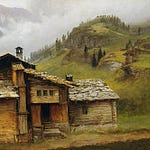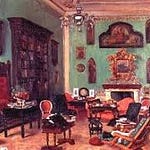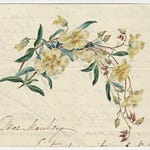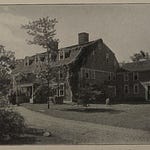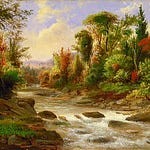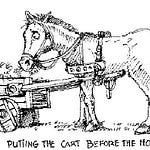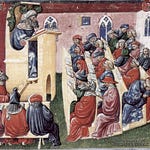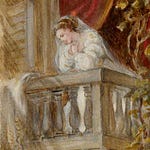The scene described in our Poem of the Week is a pleasant hall in Newark castle, in the lowlands of Scotland, just over the border from England. An old man with a harp has been singing to the ladies a sweet and wistful song of events more than a hundred years before, when Margaret of Branksome was in love with Henry, the earl of Cranston, though her mother held a deadly grudge against Henry’s whole clan. Would true love prevail against hatred and vengeance?
At the time that the man with the harp was singing of, the “old religion” still held sway in Scotland, and people made pilgrimages as acts of penance for their sins, traveling at great expense and in no great comfort as far as Palestine. So do the knights and ladies in the old man’s song. Yet they had a powerful love for the places where they were born. And this is a paradox I have often noted, that sometimes the pilgrim, the wanderer over the face of the earth, is the man who loves his home the most. He isn’t a tourist, this pilgrim. He seeks out the holy place, and so will he consider his home to be holy, too. In fact, when the ladies in the audience ask the minstrel, just before he finishes his song, why he lives destitute in Scotland, going from place to place, rather than make a good living in England, he gently rebukes them for slighting their native country. And then he utters the lines I am including below — lines once well-known by both Englishman and Scot and American too, and I imagine that even men transported to the savannahs of Australia might have thrilled to hear them.
Their author was Sir Walter Scott, as pure a patriot as you could wish,
who accepted the union of England and Scotland and who was a member of the Church of England, who knew that nothing on this earth lasts forever, but who was devoted all the more to the lands, the rivers, the songs, the folkways, and the warriors and fair ladies of Scotland, as rugged and rude as that land might be. Let’s say that in his heart, Walter Scott was the essential pilgrim, loving his place and yet knowing that it cannot be the end. With this in mind, let’s then hear how the old man in The Lay of the Last Minstrel explains why he prefers to be poor in Scotland to being well fed anywhere else:
Breathes there the man, with soul so dead, Who never to himself hath said, This is my own, my native land! Whose heart hath ne'er within him burned, As home his footsteps he hath turned, From wandering on a foreign strand! If such there breathe, go, mark him well; For him no Minstrel raptures swell; High though his titles, proud his name, Boundless his wealth as wish can claim; Despite those titles, power, and pelf, The wretch, concentered all in self, Living, shall forfeit fair renown, And, doubly dying, shall go down To the vile dust from whence he sprung, Unwept, unhonored, and unsung.
O Caledonia! stern and wild, Meet nurse for a poetic child! Land of brown heath and shaggy wood, Land of the mountain and the flood, Land of my sires! what mortal hand Can e'er untie the filial band That knits me to thy rugged strand! Still as I view each well-known scene, Think what is now, and what hath been, Seems as, to me, of all bereft, Sole friends thy woods and streams were left; And thus I love them better still, Even in extremity of ill. By Yarrow's stream still let me stray, Though none should guide my feeble way; Still feel the breeze down Ettrick break, Although it chill my withered cheek: Still lay my head by Teviot Stone, Though there, forgotten and alone, The Bard may draw his parting groan.
But let’s not think that Scott let his Last Minstrel rest entirely unappreciated. The fact is, we love the patriot, and we love the pilgrim, and when someone sings of what he has seen and loved and is no more, even the youngest among us will stop and listen and forget the bustle of the world. The youngest — maybe they most of all will do so, with all their lives before them. This is how Scott ends his poem, describing what the last years of the unnamed Minstrel are like:
Hushed is the harp: the Minstrel gone. And did he wander forth alone? Alone, in indigence and age, To linger out his pilgrimage? No; close beneath proud Newark's tower, Arose the Minstrel's lowly bower; A simple hut; but there was seen The little garden hedged with green, The cheerful hearth, and lattice clean. There sheltered wanderers, by the blaze, Oft heard the tale of other days; For much he loved to ope his door, And give the aid he begged before. So passed the winter's day; but still, When summer smiled on sweet Bowhill, And July's eve, with balmy breath, Waved the blue-bells on Newark heath; When throstles sung in Harehead-shaw, And corn was green on Carterhaugh, And flourished, broad, Blackandro's oak, The aged Harper's soul awoke! Then would he sing achievements high, And circumstance of chivalry, Till the rapt traveler would stay, Forgetful of the closing day; And noble youths, the strain to hear, Forsook the hunting of the deer; And Yarrow, as he rolled along, Bore burden to the Minstrel's song.
Word & Song is an online magazine devoted to reclaiming the good, the beautiful, and the true. We publish six essays each week, on words, classic hymn, poems, films, and popular songs, as well a weekly podcast, alternately Poetry Aloud or Anthony Esolen Speaks. To support this project, please join us as a free or paid subscriber.





